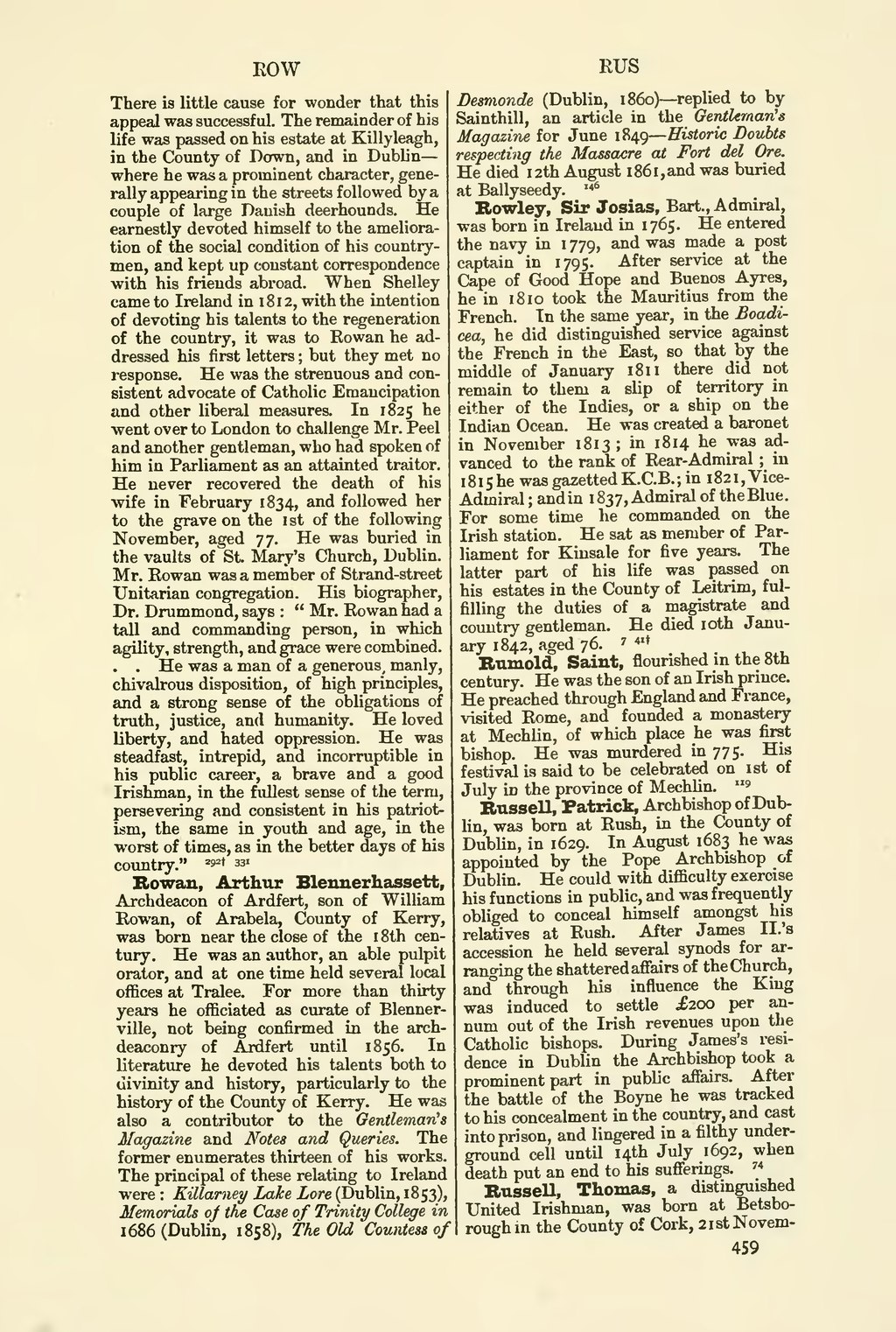ROW
There is little cause for wonder that this appeal was successful. The remainder of his life was passed on his estate at Killyleagh, in the County of Dorwn, and in Dublin — where he was a prominent character, gene- rally appearing in the streets followed by a couple of large Danish deerhounds. He earnestly devoted himself to the ameliora- tion of the social condition of his country- men, and kept up constant correspondence with his friends abroad. When Shelley came to Ireland in 1812, with the intention of devoting his talents to the regeneration of the country, it was to Rowan he ad- dressed his first letters ; but they met no response. He was the strenuous and con- sistent advocate of Catholic Emancipation and other liberal measures. In 1825 he went over to London to challenge Mr. Peel and another gentleman, who had spoken of him in Parliament as an attainted traitor. He never recovered the death of his wife in February 1834, and followed her to the grave on the ist of the following November, aged 77. He was buried in the vaults of St. Mary's Church, Dublin. Mr. Rowan was a member of Strand-street Unitarian congregation. His biographer. Dr. Drummond, says : " Mr. Rowan had a tall and commanding person, in which agility, strength, and grace were combined. . . He was a man of a generous, manly, chivalrous disposition, of high principles, and a strong sense of the obligations of truth, justice, and humanity. He loved liberty, and hated oppression. He was steadfast, intrepid, and incorruptible in his public career, a brave and a good Irislunan, in the fullest sense of the term, persevering and consistent in his patriot- ism, the same in youth and age, in the worst of times, as in the better days of his country." =5=t 33«
Rowan, Arthur Blennerhassett, Archdeacon of Ardfert, son of William Rowan, of Arabela, County of Kerry, was born near the close of the 1 8th cen- tury. He was an author, an able pulpit orator, and at one time held several local offices at Tralee. For more than thirty years he officiated as curate of Blenner- ville, not being confirmed in the arch- deaconry of Ardfert until 1856. In literature he devoted his talents both to divinity and history, particularly to the history of the County of Kerry. He was also a contributor to the Oentlemaii's Magazine and Notes and Queries. The former enumerates thirteen of his works. The principal of these relating to Ireland were : Killarney Lake Lore (Dublin, 1853), Memorials 0/ the Case of Trinity College in 1686 (Dublin, 1858), The Old Countess of
RUS
Desmonde (Dublin, i860)— replied to by Sainthill, an article in the Gentleman's Magazine for June 1849 — Historic Doubts respecting the Massacre at Fort del Ore. He died 12th August i86i,andwas buried at Ballyseedy. '^*
Rowley, Sir Josias, Bart., Admiral, was born in Ireland in 1765. He entered the navy in 1 779, and was made a post captain in 1795. After service at the Cape of Good Hope and Buenos Ayres, he in 18 10 took the Mauritius from the French. In the same year, in the Boadi- cea, he did distinguished service against the French in the East, so that by the middle of January 181 1 there did not remain to them a slip of territory in either of the Indies, or a ship on the Indian Ocean. He was created a baronet in November 1813 ; in 1814 he was ad- vanced to the rank of Rear- Admiral ; in 1 8 1 5 he was gazetted K.C.B. ; in 1 82 1 , Vice- Admiral ; and in 1837, Admiral of the Blue. For some time he commanded on the Irish station. He sat as member of Par- liament for Kinsale for five years. The latter part of his life was passed on his estates in the County of Leitrim, ful- filling the duties of a magistrate and country gentleman. He died loth Janu- ary 1842, aged 76. 7 "'♦
Rumold, Saint, flourished in the 8th century. He was the son of an Irish prince. He preached through England and France, visited Rome, and founded a monastery at Mechlin, of which place he was first bishop. He was murdered in 775. His festival is said to be celebrated on ist of July in the province of Mechlin. "'
Russell, Patrick, Archbishop of Dub- lin, was born at Rush, in the County of Dublin, in 1629. In August 1683 he was appointed by the Pope Archbishop of Dublin. He could with difficulty exercise his functions in public, and was frequently obliged to conceal himself amongst his relatives at Rush. After James II.'s accession he held several synods for ar- ranging the shattered afi"airs of the Church, and through his influence the King was induced to settle ^200 per an- num out of the Irish revenues upon the Catholic bishops. During James's resi- dence in Dublin the Archbishop took a prominent part in public affairs. After the battle of the Boyne he was tracked to his concealment in the country, and cast into prison, and lingered in a filthy under- ground cell until i^th July 1692, when death put an end to his sufferings. 7"
Russell, Thomas, a distmguished United Irishman, was born at Betsbo- roughin the County of Cork, 2istNovem- 459
